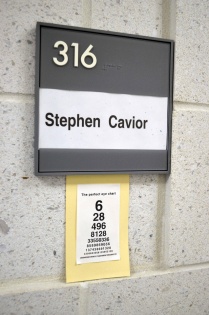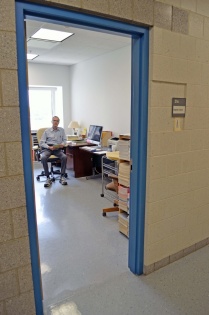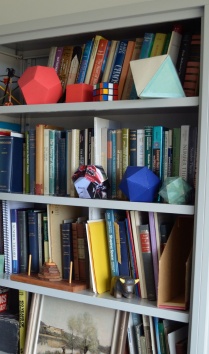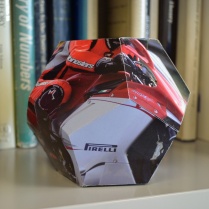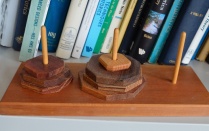Stephen Cavior reflects on fifty years of teaching, research, and service
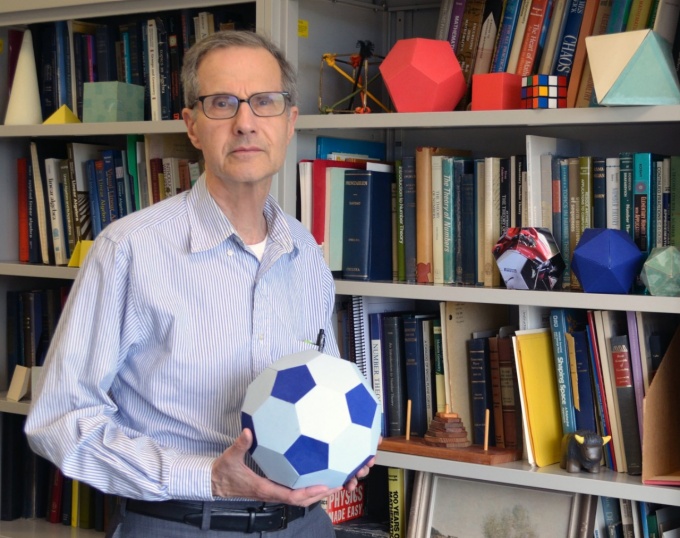
Stephen Cavior
Published December 9, 2016 This content is archived.
Stephen Cavior is the longest serving professor in the history of our department, giving 50 years to UB Math before his 2013 retirement.
He earned his BA from Swarthmore College in 1959 and his doctorate from Duke in 1963, joining our department immediately afterward. This was a time of torrid hiring in the department; Steve was one of eight new faculty members to arrive in the Fall of 1963.
Steve advised almost 50 master’s students. He continues to come into the department several times each week, and we had an opportunity to catch up with Steve and ask a few questions.
What were your favorite courses to teach?
One was certainly Abstract Algebra. But I didn’t get to teach it all that often because it was very popular with the faculty and I had to wait my turn. I always found it fun to guide the class through what I consider a mathematical wonderland where sets and actions become the objects of other sets. And it was very rewarding to watch the students become more comfortable with these strange new ideas.
Two others favorites were Combinatorics and Graph Theory, which I designed and first offered in the 1980s. Both of these courses have had a wonderful following over the years.
You have advised far more master’s students than anyone else on the faculty. How many and why so many !?
In 1969 I became the director of the UB Summer Mathematics Institute, which was one of the programs funded by the NSF right after Sputnik to strengthen the preparation of high-school teachers. In our program the teachers studied here for four consecutive summers, taking three courses every year from a comprehensive list of a dozen. The final requirement for the Master’s Degree was to complete a project, and as director, it was my responsibility to be the supervisor. Typically a student would write a project showing how to structure a course for a high school audience based on topics from a subject he had just studied here. I offered encouragement and critical feedback about what could or couldn’t work, and needless to say there were many rewrites. Forty-five of my Master’s students came through this program, and another wrote a thesis in number theory.
How has the department changed over the years?
The most obvious change I see is that the new tenure requirements and the pressure to get grants have made the department a more anxious place. Also, chronic budget problems have limited our course offerings and boosted average class size.
What I remember best from my early days here is how smoothly and cooperatively the new and the senior faculty worked together to develop our programs and extend our reach more regionally and nationally.
New faculty especially were encouraged to offer courses or seminars in their specialties, even if they drew only small enrollments, and we younger folks felt real excitement in knowing that we were helping to move the department in a new direction. I wish that every young person could feel that excitement at the start of a career.
Another happy memory was the remarkable sociability of the group, and I don’t mean only the parties. It was pretty typical for a dozen people to take a colloquium speaker to dinner, and it didn’t matter if you were an algebraist or a topologist. It was just something we all wanted to do together. And the graduate students were involved in our social functions, too.
How have the students changed over the years?
With all the new courses and programs available at UB today, students seem to be busier than ever. Years ago, when they had more time, they would often stop by my office to show me a really neat solution to a homework problem, or just to talk about some class topic that caught their interest. Those conversations would make my day, and I’ve missed having them.
Any favorite piece of mathematics?
My favorite corner of mathematics is combinatorics. My interest in it began when I was writing my dissertation and needed to study some equations over finite fields. Over the years I’ve become fascinated by the complex and amazing things that combinatorial arguments can lead to. (Talk about elegant proofs!)
When I was in graduate school there were very few books on the subject, and relatively little research activity in it, but today it’s an important and busy field with broad applications in science and technology. And there are even movies about it!
Any advice to give today’s graduates?
My advice would be this: read very widely, because you never know when an idea may prove to be helpful. A good example of this is in the coding theory text by Sloane and MacWilliams, where they solve their problems using algebra, linear algebra, geometry, combinatorics, and complex variables. And of course interests outside of mathematics are essential for balance.
Plans for retirement?
For the time being I’m going to stay put. I want to complete some writing projects and then take a year to regroup and decide what my new focus will be. In the meantime I want to enjoy more of the cultural life of UB and of the community.
Also, I’d like to return to music. I used to play classical guitar and have let that slide.
Anything else you’d like to add?
This is said with the utmost sincerity and honesty. In looking back on my long career, I’d say that I’ve been the luckiest of people. I’ve had the tremendous honor and privilege of teaching young men and women, and telling them about a subject of great beauty and importance.
My job has allowed me to remain a lifelong student, and all the while I’ve been here I’ve had a very companionable bunch of colleagues. Also, I’ve been blessed with a group of chairs who for the most part were always willing to listen to my ideas. So if that doesn’t make a perfect job, I don’t know what does.
Steve would be delighted to hear from his students, friends and colleagues. His email is cavior@buffalo.edu
